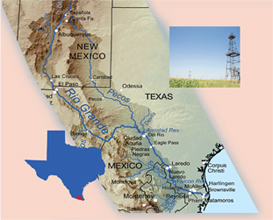A long article in Inside Climate News delves into the problems with the Rio Grande.
The source of the Rio Grande lies in the San Luis Valley of southern Colorado. But it often runs dry in a stretch between El Paso and Presidio, TX. At Presidio, it is revived by water flowing from Mexico’s Conchas River, which after that point supplies three quarters of the river’s water.

Since the Rio Grande is part of the border between the two nations, a 1944 treaty was signed whereby they would share the water. The United States is entitled to one-third of the flow that reaches the Rio Grande from the Conchos and five other smaller tributaries in Mexico.
The treaty dictates that the U.S. must receive an average of 350,000 acre-feet of water from these sources annually over five-year cycles. As of September 23, near the end of the third year of the present cycle, the U.S. had received less than 400,000 acre-feet total—less than a quarter of what Mexico owes.
Farmers in the Mexican state of Chihuahua want the water for themselves. Major crops in the area include pecans and alfalfa.
In the past, Mexico used runoff from rainfall downstream of the La Boquilla Dam to fulfill its requirements to the United States. Increased heat and drought have reduced this supply and tightened demand.
In 2020, at the end of the previous five-year cycle, Mexico was similarly behind. Protestors gathered at La Boquilla Dam to protest and stop the transfers. The Mexican government sent in the national guard, and one guard was killed. The Mexican government, striking a last-minute deal, transferred water from international reservoirs instead.
At this point in the five-year cycle, which ends in 2025, Mexico is even further behind. The U.S. and Mexico are negotiating a new addition to the treaty to ensure reliable water deliveries before the current five-year cycle ends in 2025.
On September 28, Texas senators Ted Cruz and John Cornyn introduced a measure to enforce Mexico’s compliance with the treaty.
As usual, increased heat and drought have made the problem worse.
Maybe a fair solution can be found, although it is not likely to be a happy one for all concerned. Carlos Rubinstein, a water consultant in Austin, TX, is not optimistic.
“If Mexico gives us water, the farmers in Mexico are going to feel cheated out of a portion of the water that they could have had,” Rubinstein says. “Conversely, if Mexico fails to comply with the treaties, then guess what? Texas farmers are going to feel cheated that the treaty is not being adhered to.”



